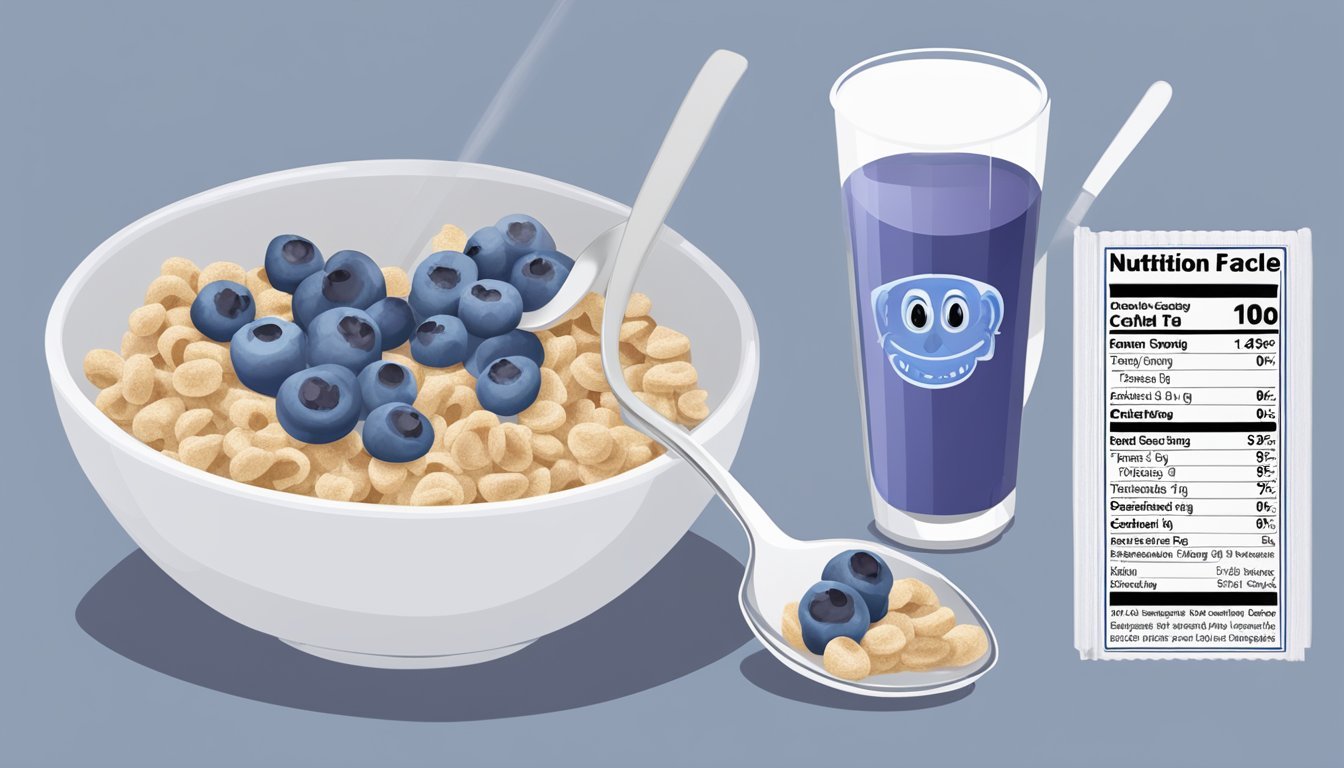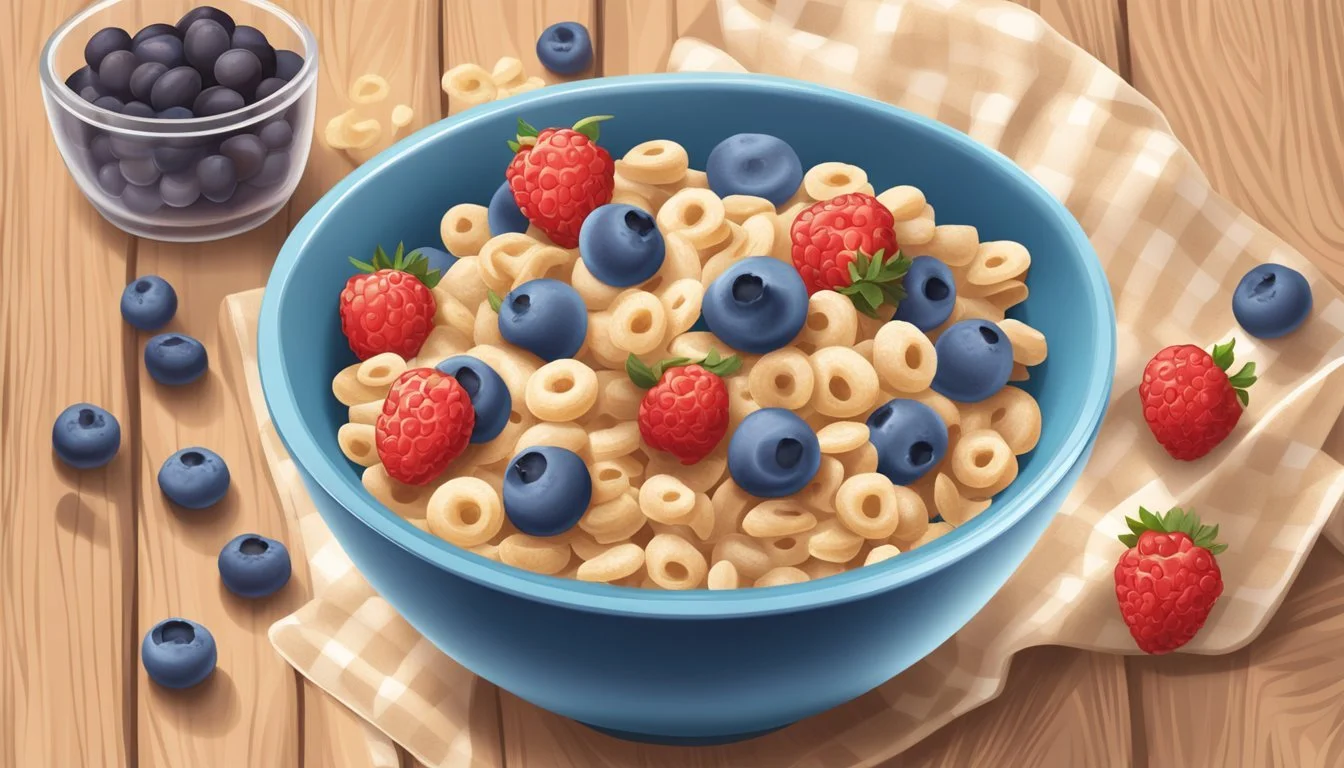Boo Berry Nutrition Facts & More
Essential Facts About the Spooky Cereal
Boo Berry, the beloved monster-themed cereal from General Mills, has been a breakfast favorite for generations. This fruity, ghostly treat offers more than just a spooky good time - it also provides essential nutrients to start the day.
A single serving of Boo Berry cereal contains 130 calories, with 85% of those calories coming from carbohydrates. The cereal is low in fat, with only 1.5 grams per serving, and provides a modest 5% of calories from protein. General Mills has fortified Boo Berry with several important vitamins and minerals, making it a more nutritious option than some might expect.
Boo Berry stands out for its iron content, providing 56% of the daily recommended value per serving. It also offers significant amounts of vitamin A and vitamin B6, contributing to overall health and wellbeing. While it may not be the most nutritionally dense breakfast option, Boo Berry can be part of a balanced diet when consumed in moderation.
Nutritional Profile
Boo Berry cereal provides a mix of macronutrients, vitamins, and minerals. It contains significant amounts of carbohydrates and added sugars, along with small amounts of protein and fat.
Macronutrient Breakdown
A 1-cup (30g) serving of Boo Berry cereal contains approximately 130 calories. The macronutrient composition is heavily skewed towards carbohydrates, which make up about 85% of the total calories. Protein accounts for 5% of calories, while fat contributes 10%.
The total carbohydrate content is around 27 grams per serving. This includes both complex carbohydrates from whole grain corn and simple sugars added for sweetness. The protein content is relatively low at about 1-2 grams per serving.
Fat content is minimal, with less than 1 gram per serving. This includes small amounts of polyunsaturated and monounsaturated fats, with no trans fats present.
Vitamins and Minerals
Boo Berry cereal is fortified with several essential vitamins and minerals. It provides significant amounts of iron, with one serving supplying about 56% of the daily value (DV).
The cereal also contains vitamin A (15% DV) and vitamin B6 (38% DV). Other B-vitamins like thiamin, riboflavin, niacin, and folic acid are typically added to fortified cereals as well.
Calcium and vitamin D may be present in small amounts, especially if the cereal is consumed with milk. The exact quantities of other minerals like zinc, phosphorus, and magnesium can vary.
Sugars and Sweeteners
Added sugars are a significant component of Boo Berry cereal. The exact amount can vary, but it typically ranges from 9 to 12 grams per serving.
The main sweeteners used include sugar and corn syrup. The marshmallow pieces in the cereal contain additional sweeteners like dextrose and modified corn starch.
These added sugars contribute to the cereal's sweet taste but also increase its calorie content and may impact blood sugar levels when consumed.
Fiber Content
The fiber content in Boo Berry cereal is relatively low compared to some other breakfast cereals. A typical serving provides about 1-2 grams of dietary fiber.
This fiber comes primarily from the whole grain corn used in the cereal. While it contributes to the overall nutritional profile, it falls short of providing a significant portion of the recommended daily fiber intake.
Increasing fiber intake may require combining the cereal with high-fiber fruits or choosing cereals specifically formulated for higher fiber content.
Fats and Fatty Acids
Boo Berry cereal is very low in fat, with less than 1 gram per serving. The small amount of fat present is a mix of polyunsaturated and monounsaturated fats.
Saturated fat content is negligible, and the cereal contains no trans fats. The low fat content contributes to the cereal's relatively low calorie density.
While the cereal itself provides minimal essential fatty acids, consuming it with milk can add some beneficial fats to the meal. The overall fat profile of Boo Berry cereal aligns with low-fat dietary recommendations.
Health Considerations
Boo Berry cereal raises several important nutritional factors to consider. Its nutrient profile impacts energy intake, cardiovascular health markers, and suitability for certain diets.
Energy and Caloric Value
A 1-cup serving of Boo Berry cereal contains 127-130 calories. This represents about 6-7% of a 2000 calorie daily diet. The cereal is primarily carbohydrate-based, with 85% of calories coming from carbs. It provides quick energy but may not promote lasting fullness.
Fat content is relatively low at 10% of calories. The cereal contains 0.5g each of polyunsaturated and monounsaturated fats per serving. Protein makes up only 5% of the calorie content.
Sodium and Cholesterol Content
Boo Berry cereal contains 0mg of cholesterol, making it suitable for low-cholesterol diets. Sodium content is not explicitly stated in the search results. Many breakfast cereals are significant sodium sources, so checking the label is advisable for those monitoring sodium intake.
The cereal's low saturated and trans fat content aligns with heart-healthy eating patterns. However, its high sugar content may offset some cardiovascular benefits.
Dietary Restrictions and Allergens
Boo Berry cereal is GMO-free and certified kosher, accommodating certain dietary preferences. The cereal may contain common allergens like wheat, so individuals with gluten sensitivities should review ingredients carefully.
Its high carbohydrate content (85g per 100g) makes it unsuitable for low-carb or ketogenic diets. Those following such diets typically aim for under 50g net carbs daily.
The cereal provides some micronutrients, including 56% of the Daily Value for iron, 15% for vitamin A, and 38% for vitamin B6 per serving. These contribute to its overall nutritional profile.
Eating Habits and Serving Suggestions
Boo Berry cereal offers versatile options for consumption. Its unique flavor profile and nutritional content allow for various serving methods and creative recipe ideas.
Portion Size and Frequency
A typical serving size of Boo Berry cereal is 1 cup (33 grams). This portion provides approximately 130 calories. For weight management, it's important to stick to the recommended serving size.
Consuming Boo Berry cereal occasionally as part of a balanced diet is generally acceptable. However, due to its sugar content, it's not advisable to eat it daily.
For those monitoring their carbohydrate intake, Boo Berry contains about 27 grams of total carbs per serving. This accounts for a significant portion of the daily carb allowance for many diets.
Combination with Other Foods
Boo Berry cereal can be paired with various foods to create a more balanced meal. Adding low-fat milk or a milk alternative increases protein and calcium content.
Fresh berries or sliced bananas can boost the nutritional value and enhance the berry flavor. For added protein and healthy fats, consider topping with a handful of nuts or seeds.
Yogurt parfaits layered with Boo Berry cereal can make a fun and tasty breakfast or snack option. This combination provides probiotics and additional nutrients.
Recipe Variations and Homemade Options
Boo Berry cereal can be incorporated into various recipes for a unique twist. It can be used as a topping for ice cream or frozen yogurt for a crunchy texture.
Crushing the cereal and using it as a coating for baked chicken or fish creates a fun, colorful dish. It can also be added to homemade trail mix for a sweet element.
For a healthier alternative, create a homemade version using whole grain cereal, dried blueberries, and natural food coloring. This allows for control over sugar content and additives.
Boo Berry can be blended into smoothies for a berry boost. Mix with frozen mixed berries, yogurt, and milk for a "Very Berry Smoothie" inspired by the cereal's flavor profile.
Comparative Analysis
Boo Berry cereal's nutritional profile can be evaluated against similar breakfast cereals and market alternatives. This analysis examines how Boo Berry stacks up nutritionally and explores comparable options for consumers.
Similar Foods and Alternatives
Boo Berry cereal belongs to the category of sweetened, flavored breakfast cereals. Its closest counterparts include other monster-themed cereals like Count Chocula and Franken Berry. These cereals share similar nutritional profiles, with high carbohydrate content and added sugars.
Healthier alternatives to Boo Berry include whole grain cereals, oatmeal, and unsweetened muesli. These options typically offer more fiber, protein, and essential nutrients with less added sugar. For those seeking a similar flavor profile, some brands produce berry-flavored cereals with reduced sugar content or added whole grains.
Market Variants and Brand Comparisons
General Mills produces Boo Berry as part of its monster cereal line. Other major cereal brands offer comparable fruit-flavored options, often with slight variations in nutritional content.
Boo Berry contains 130 calories per serving, which is relatively standard for sweetened cereals. Its macronutrient breakdown is approximately 85% carbohydrates, 10% fat, and 5% protein. This composition is similar to many other flavored cereals on the market.
Some brands offer reduced-sugar or whole grain versions of fruit-flavored cereals. These alternatives may provide more fiber and less sugar while maintaining a similar taste profile. Consumers concerned about artificial colors may find options using natural food dyes as alternatives to Boo Berry's artificial coloring.
Conclusion
Boo Berry cereal offers a mix of nutritional benefits and indulgent flavors. It contains essential vitamins and minerals, including iron and B vitamins. The cereal is low in fat and cholesterol-free.
While Boo Berry provides some nutrients, it's high in sugar and processed ingredients. Moderation is key when incorporating it into a balanced diet. Pairing it with protein-rich foods can help create a more satisfying meal.
The cereal's vitamin and mineral content contributes to daily nutritional needs. However, it shouldn't be relied upon as a primary source of nutrients. Whole foods and a varied diet remain essential for optimal health.
Consumers should be aware of portion sizes to manage calorie and sugar intake. Reading nutrition labels helps make informed choices about how Boo Berry fits into one's overall dietary plan.
For those seeking a nostalgic treat, Boo Berry can be enjoyed occasionally as part of a well-rounded breakfast or snack. Balance and variety remain crucial for maintaining a healthy diet.






